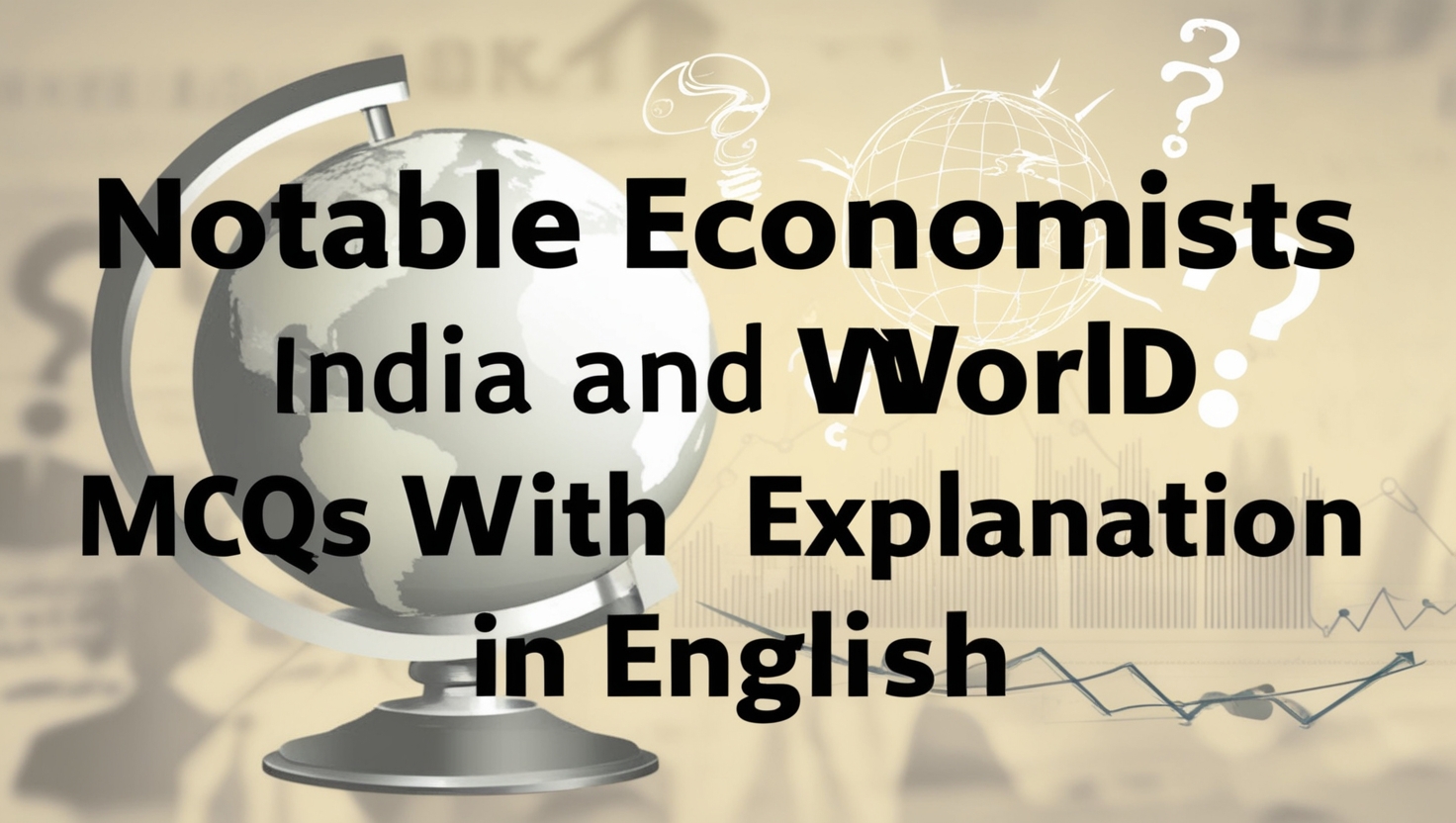
Economists have played a crucial role in shaping financial systems and policies around the world, influencing economies with their theories and insights. This article, titled Notable Economists India and World GK MCQs With Answer & Explanation in English, presents a series of multiple-choice questions designed to test and enhance your understanding of significant economists from both India and around the globe.
Whether you’re a student, an economics enthusiast, or preparing for competitive exams, these MCQs, along with detailed answers and explanations, will deepen your knowledge and appreciation of these influential figures. Dive in to expand your economic awareness!
1. Who among the following Indian Economists have played a crucial role in the MNREGA formerly NREGA?
- Amartya Sen
- Jean Dreze
- Jagdish Natwarlal Bhagwati
- Dr. Vijay Kelkar
Show Answer
Answer: Jean Dreze
Jean Dreze, an economist of Indian origin born in Belgium, conceptualised and drafted the first version of MNREGA (Mahatma Gandhi National Rural Employment Guarantee Act). He played a crucial role in the formulation of this social welfare scheme aimed at providing guaranteed employment to rural households in India.
2. What was the nationality of Mahbub ul Haq, one of the pioneers of Human development theory and co-founder of the Human Development Report?
- UK
- USA
- Pakistan
- India
Show Answer
Answer: Pakistan
Mahbub ul Haq was a Pakistani economist and politician who co-founded the Human Development Report and played a significant role in the development of the Human Development Index (HDI). He is considered one of the pioneers of the theory of human development theory.
3. Who among the following gave the Communist Manifesto?
- Adam Smith
- Karl Marx and Friedrich Engels
- James Tobin
- None of the above
Show Answer
Answer: Karl Marx and Friedrich Engels
The Communist Manifesto, a political document written in 1848, was authored by German philosophers Karl Marx and Friedrich Engels. It outlines their theories on the history of society and the class struggles leading to the establishment of communism.
4. In which year was Adam Smith’s work “An Inquiry into the Nature and Causes of the Wealth of Nations” published?
- 1766
- 1756
- 1776
- 1786
Show Answer
Answer: 1776
Adam Smith’s seminal work “An Inquiry into the Nature and Causes of the Wealth of Nations” was published in the year 1776. This book laid the foundation for modern economics and is considered one of the most influential works in the field of economics.
5. Who was instrumental in the development of the policy called Laissez Faire?
- Adam Smith
- Alan Greenspan
- Francis Fukuyama
- Amartya Sen
Show Answer
Answer: Adam Smith
Adam Smith, a Scottish economist and philosopher, is credited with the development of the policy called Laissez Faire. This policy advocates minimal government intervention in economic affairs, allowing the free market forces to regulate themselves.
6. Who is called the founding father of modern economics?
- J.S. Mill
- Karl Marx
- David Ricardo
- Adam Smith
Show Answer
Answer: Adam Smith
Adam Smith, a Scottish political economist and philosopher, is often referred to as the founding father of modern economics. His book “The Wealth of Nations” (1776) laid the groundwork for classical economics and popularised the concept of free markets and the invisible hand.
7. Who is the author of Das Kapital?
- JS Mill
- Adam Smith
- Karl Marx
- None of the above
Show Answer
Answer: Karl Marx
Das Kapital is a foundational theoretical text in materialist philosophy, economics, and politics, written by Karl Marx, a German philosopher, economist, and political theorist. It was first published in 1867 and remains a significant work in the field of economics.
8. Who is the author of “End of history and the last man”?
- Karl Marx
- J.S. Mill
- Francis Fukuyama
- None of the above
Show Answer
Answer: Francis Fukuyama
“The End of History and the Last Man” is a book of political philosophy written by Francis Fukuyama, an American political economist and author. Published in 1992, the book explores the idea of liberal democracy as the endpoint of mankind’s ideological evolution.
9. Which economist publicly opposed Keynes and supported private spending during a recession?
- Thomas Malthus
- Friedrich Hayek
- Arthur Pigou
- Gary Becker
Show Answer
Answer: Friedrich Hayek
Friedrich Hayek, an Austrian economist, was a prominent critic of Keynesian economics. He opposed Keynes’ theories of government spending as a solution to recessions and instead advocated for private investment and market-driven solutions.
10. Who is the author of the book “The Argumentative Indian”?
- Amartya Sen
- Raghuram Rajan
- P.C. Mahalanobis
- Bibek Debroy
Show Answer
Answer: Amartya Sen
“The Argumentative Indian” is authored by Amartya Sen. The book, published in 2005, explores India’s intellectual and cultural history, focusing on the importance of public debate and the tradition of open discussions in Indian society.








Leave a Reply